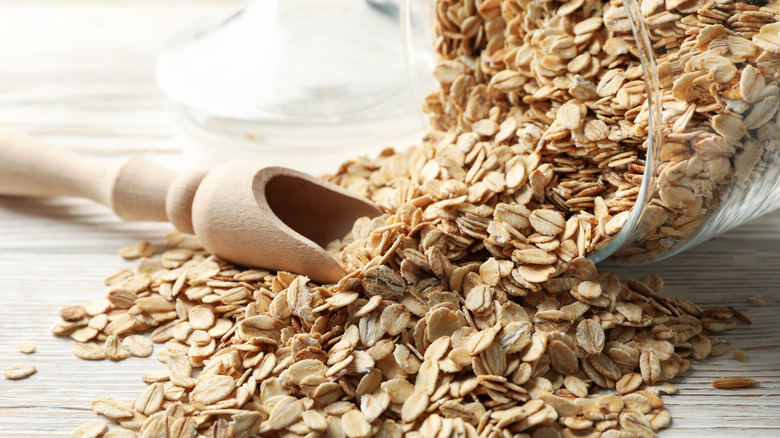Is It Dangerous To Eat Expired Oats?
Some foods have a short shelf life and can go bad within a day or two, but oatmeal isn't one of them. This beloved breakfast staple can last for years beyond its expiration date without losing flavor. However, its exact shelf life depends on the type of oats, how they are cooked, and where you store them. There are also a couple of mistakes you need to avoid with oatmeal to keep it fresh for longer and reap its benefits.
In a 2023 study published in the journal Food Chemistry, researchers stored several oat samples at different temperatures for 42 weeks. Perhaps not surprisingly, the level of volatile compounds in these grains increased over time due to oxidation and other chemical reactions. As a result, older oat samples were more likely to have an off flavor. This brings up the question, is it safe to eat expired oats, and how should you store them to extend their shelf life and prevent them from going rancid? Let's find out.
Oats don't really expire, but they can go bad
Like pasta and other dry ingredients, oats can last for years if stored properly. However, it's best stored for up to one year, especially if you've opened the box. But again, these guidelines are not set in stone. For example, depending on the manufacturer, quick-cooking rolled oats can last up to 30 years. By comparison, steel-cut oats have a shelf life of one to two years. The same goes for instant oatmeal, though some varieties contain cream, dried fruit, and other ingredients with a shorter shelf life.
Generally, it's safe to eat expired oats as long as they have no signs of mold or insect infestation. After all, grains, seeds, nuts, spices, and other dried foods can be contaminated with pests, even if the packaging remains intact, as per the University of Minnesota. In turn, beetles, weevils, moths, and other pantry pests can ruin your food, turning it into a health hazard, according to the University of California Integrated Pest Management Program.
Last but not least, oats are rich in free fatty acids. Due to their high-fat content, they can become rancid over time and develop a bitter flavor. The grains may also lose their crunchiness, especially when exposed to air.
How to store oats for maximum shelf life
The best way to store grains depends on how and when you plan to use them. While it's perfectly fine to store oats in your pantry, you'd be better off keeping them in the freezer over the long term. Freezing or refrigerating your oats helps prevent mold growth and insect infestation.
If you prefer to keep them in the pantry, place them in an airtight container or food-grade bucket. You may also store them along with a food-grade silica gel packet to prevent excess moisture. The room temperature should not exceed 68 degrees Fahrenheit, whereas the humidity should be 12.5% or less. Cooked oatmeal has a shorter shelf life than dry oats, so it's best to store it in the fridge and serve it within five days.
As discussed earlier, expired oats are safe to eat as long as they preserve their texture, flavor, and aroma. Another option is to toast your oats in butter to bring out their flavor and crunchiness, even if they've been sitting in your pantry for months.


